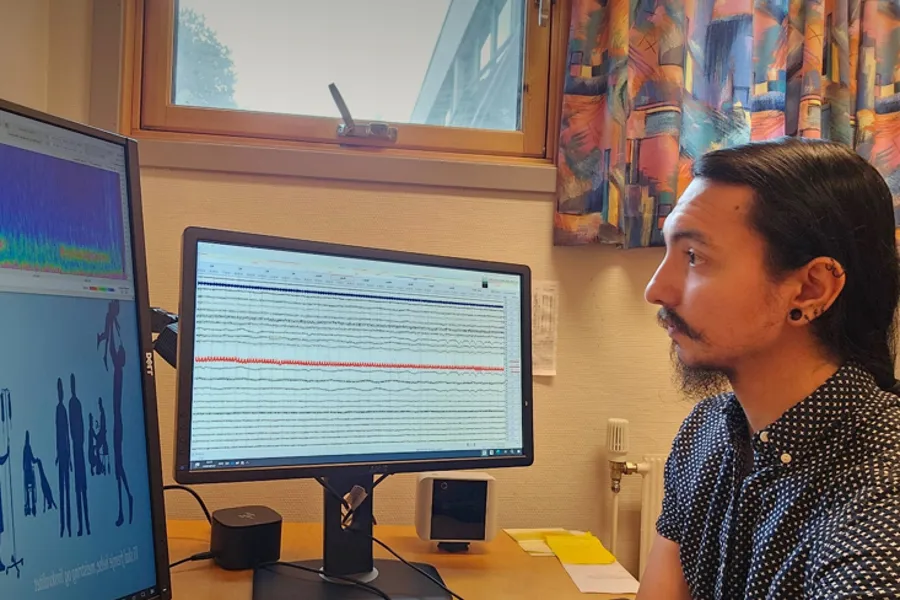COGNITIVE_SERVICE_TRANSLATE_ERROR
COGNITIVE_SERVICE_TRANSLATE_ERROR

Dementia is a major health challenge, and early detection of neurodegenerative diseases is essential for the evaluation of new treatments and interventions. Among several diagnostic tests for neurodegenerative diseases, measuring brain electrical activity using methods such as electroencephalography (EEG) has gained increasing interest among researchers as a non-invasive and potentially ambulatory test.
Researchers at Stavanger University Hospital and the University of Stavanger have explored an integrated approach to analyzing brain signals collected at multiple research centers around the world, with a view to evaluating the potential of using artificial intelligence to identify different types of neurodegenerative diseases such as Parkinson's and Alzheimer's disease in the early stages.
The project emphasizes the importance of addressing variations in brain signals when comparing data from different EEG systems. Compared to traditional analysis procedures, reducing these EEG system related factors led to an improved correct identification of the diagnostic group. In addition, a combined evaluation of different attributes of EEG signals (e.g., rhythm and regularity patterns) increased the proportion of correctly classified patients.
The complete results are available in the doctoral thesis "Neural networks dysfunction: From resting-state electroencephalography to dementia diagnosis", written by Alberto Jaramillo Jiménez which will be presented on 23 August at Stavanger University Hospital.
Click here to read the thesis: UiS Brage: Neural networks dysfunction: From resting-state electroencephalography to dementia diagnosis (unit.no)
Press release in English
Dementia is a major healthcare challenge and early detection of neurodegenerative diseases is crucial for evaluation of novel treatments and interventions. Among multiple diagnostic tests for neurodegenerative diseases, assessing the electrical activity of the brain using methods such as electroencephalography (EEG) has gained interest in researchers as a non-invasive and potentially portable test.
A group of researchers at Stavanger University Hospital and University of Stavanger examined an integrative approach to analyze brain signals collected in multiple research centres worldwide, evaluating the potential use of artificial intelligence to identify various types of neurodegenerative diseases such as Parkinson's and Alzheimer's Disease in the early stages.
The project underscores the importance of addressing variations in brain signals when comparing data from different EEG-systems. Compared to traditional analysis procedures, mitigating these EEG-system related factors improved the correct identification of the diagnosis. In addition, combined evaluation of different attributes of EEG signals (e.g., rhythmicity and regularity patterns) increased the proportion of correctly classified individuals.
The complete results are available in the PhD thesis “Neural networks dysfunction: From resting-state electroencephalography to dementia diagnosis”, authored by Alberto Jaramillo Jiménez, and will be presented the 23rd/August/2024 at Stavanger University Hospital.
Read more here: UiS Brage: Neural networks dysfunction: From resting-state electroencephalography to dementia diagnosis (unit.no)
Contact
Alberto Jaramillo Jiménez
E-mail: alberto.jaramilloj@udea.edu.co
Adjudication Committee
First opponent:
Head of Department Tom Eichele, Haukeland University Hospital
Second opponent:
Senior Scientist Denis Engemann, Roche
Administrator:
Associate Professor Thor Ole Gulsrud, University of Stavanger
Supervisors
Main supervisor:
Professor Kolbjørn Kallesten Brønnick, University of Stavanger
Co-supervisors:
Associate Professor Ketil Oppedal, University of Stavanger
Associate Professor Laura Bonanni, University 'Gabriele d'Annunzio' of Chieti
Professor Dag Aarsland, King's College London
Chair of the public defence
Associate Professor Nina Hjertvikrem, Faculty of Health Sciences, University of Stavanger